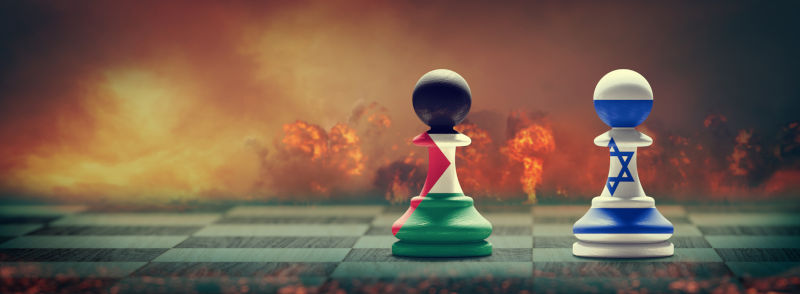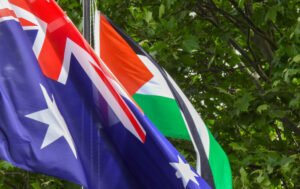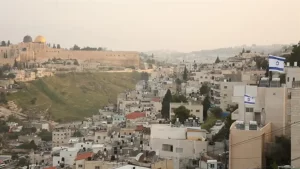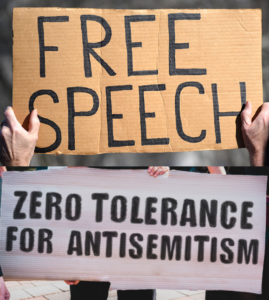
Palestine and Israel conflict. Flags on chess pawns on a chess board. 3D illustration.
This was published in Pearls & Irritations 12 December, 2023.
There is a clear need to explain to outsiders what is going on in the Jewish community in Australia. There is all-too-common assumption that there is one Jewish voice on this tragedy and this is something projected by the ‘official’ organisations. In fact, the published views of people such as Louise Adler or Jenna Price or others are probably close to those held by many people, but fear reigns, and silence reigns supreme. Few people are prepared to go public for fear of social or other retribution.
Thus, it has been a huge emotional struggle to put these thoughts into order for people outside the Jewish community, such is my revulsion at what is going on – supposedly in my name – as a politically active member of the Jewish community who has spent countless hours online over the past two months, trying to come to terms with the current disaster. I am ashamed at the complicit silence by the ‘official’ Jewish organisations in this country, or attempts to use corporate leaders and political allies to condemn others on the grounds of antisemitism.
I believe there have been four broad forms of response to what has happened in Gaza by Australian.
1) The majority. Support for Israel
This is more or less the position of ‘official’ Jewish organisations (such as the Executive Council of Australian Jewry, various peak state bodies, the Zionist Federation of Australia, and the more hawkish, private Australia-Israeli Jewish Affairs Council (AIJAC) the far-right Australian Jewish Association and the monopoly Australian Jewish News. Loyalty is impressed upon the political parties and media and Zionism is part and parcel of the Jewish school system which teaches 50% of children.
All reflect in various ways, the orientation of the Netanyahu government or its more extreme elements. At an institutional religious level, there is no expressed dissent by the leadership of different Jewish denominations. On an individual level, for both religious and secular people, the pervasiveness of intergenerational “national trauma” cannot be underestimated. People’s lives have been centred around Israel and Zionism with a subsequent blindness to Palestinian existence.
Consequently, the Hamas murders set off a tsunami of panicked emotional response. Antisemitism is seen to be rife in Australia extending to antisemitic media, schools, universities, and the commentariat (the exception being News Ltd). There is a fear of terrorism. These worries are backed up by claims of a 591% increase in antisemitic incidents, though the ECAJ will not release the full data set or its methodology for classifying incidents.
With this emotional and political response in mind, Hamas is characterised as a new form of Nazism, and by association, Palestinians are seen as willing partners in supporting a genocidal action. Reported Israeli atrocities in local and international media are regarded as lies or exaggerations. Protests against the Gaza war are also classified as intrinsically antisemitic. The inexcusable failure of many on the left to condemn Hamas for its war crimes or doubts about sex crimes is seen to further demonstrate the pervasiveness of historical antisemitism. People are obsessed about the return of the hostages whose names and faces appear on lampposts and walls in Jewish neighbourhoods in Australia. All means possible are seen as justified in rooting out an existential threat to the Jewish people. In their eyes, a just war against Hamas is being conducted, and the consequences to ordinary Palestinians are regrettable. Even if there are doubts, eyes are averted.
What happens if someone falls out of this way of thinking? One person wrote to me of realising how the traditional Zionist view of the world had failed her and she feels as if she has died.
2) A minority within the community with limited voice. Opposition to varying degrees to the actions of the Israeli government and military, and the Israeli state itself
This extends across a wide spectrum, from organisations like the New Israel Fund, an explicitly progressive Zionist organisation, supporting different projects with Jewish and Palestinian organisations. It is despised by the Jewish right and has been accused of supporting terrorism through its funding allocations. There are other smaller organisations, like the technically non-Zionist Jewish Labour Bund, remnant of the large pre-war non-Zionist socialist movement) and smaller youth and social justice organisations, and there been statements of dissent from the Israeli government position, or that of the Zionist Federation of Australia but at the same time, the centrality of Israel as the focal point as the homeland of Jews is not challenged.
The Jewish Greens have been a policy group recognised by the Greens federally and have had input into the development of the official Greens policy on Israel/Palestine, alongside the positions presented by Greens for Palestine. It is fair to say that some Green parliamentarians have been more responsive to Jewish Green concerns about language used that others. However, the Jewish Greens, as have the Greens in general, are always under attack for their policy positions on Israel.
The Australian Jewish Democratic Society has been clear in its condemnation of Hamas, but supports a ceasefire and international intervention. It has unequivocally condemned the Israeli government, for its inordinate response after October 7 but has also condemned for many years Israeli action against Palestinians and the Occupation, and the institutionalisation of a localised form of apartheid and ethnic cleansing. Like other left Jewish organisation, it opposes the clearly racist amendments to the Basic Law in Israel which gives Israeli Palestinian second-class legal status in the Jewish State. AJDS feels that it has a non-dogmatic role to play in discussing Israel and Palestine’s future and is also in contact with key Palestinian advocacy organisations, difficult as that is at the moment. It actively lobbies all parties in Canberra.
None of the organisations in this category have openly participated in protest actions with Palestinian organisations at this time because of the differences over attribution of responsibility and culpability to Hamas for murders and hostage-taking. Individuals may have done so. There also is fear of being singled out at demonstrations. There is also concern about the ongoing presence of clearly antisemitic material at demonstrations despite the laudable attempts of organisers to stop it.
On a more spontaneous organised level, there are now more than 850 signatures on a progressive and independent letter calling for a ceasefire and release of hostages, demonstrating that there are more dissenters out there. This letter is not identified with any particular organisation.
3) Outright opposition to the actions of the Israeli government and the existence of the State of Israel.
There are a number of small and recent groups such as Loud Jewish Collective (Melbourne) or Tzedek Collective (Sydney), and Jews against the Occupation ’48 which have dogmatic anti-Zionist and anti-Israel agendas. I think it is fair to say that their membership comes from people who are not comfortable with the Jewish community as a whole, or the politics of groups discussed in the previous category. Using anti-colonial concepts, they argue that there is not a conflict in the normal sense, but rather, there has been an invasion by settlers that is being legitimately resisted by Hamas on behalf of Palestinians. This ties in with the decolonialising agenda for Indigenous Australia, anti-imperialist, and other left perspectives.
These groups openly participate and speak at protest rallies about Gaza, and have engaged in Gaza-related protests outside MPs offices or other events.
4) The silent, lost, and grieving.
It is hard to know how many such people there are, but I suspect that the numbers would be quite surprisingly high.
From other responses I have observed, Jews, young and old are suffering in isolation from grief and trauma, and are grieving as much for the loss of Palestinian lives as Jewish lives. They feel that Jews and Palestinians are being held hostage by Netanyahu and his gang. They know that Biden should take strong action, and Australia should be taking a strong stand internationally, but they have no confidence in the future. They are heartbroken. While they may not feel that genocide is being committed, that know that war crimes are being committed. Others fear genocide against Jews. People who are critical of what Israel has done are scared to speak out, scared of being exiled from family, friends, even losing jobs. They feel bullied or compelled to suffer alone, in silence. They will therefore not engage in protest politics, or will not lend their name to declarations.
Thus, for those who dissent including those who have to remain silent, this a unique trauma. It is not a crisis about victimhood (expulsions across Europe in the Middle Ages, the Inquisition or the Holocaust), or a crisis of religious belief (there was one in the 1660s). While not excusing its consequences and the Naqba, to simply regard Jewish Israelis as illegal colonists does not adequately account for the tragedy of Jewish life that resulted in this population movement into Palestine over the past 150 years or so. 70% of the Jews there are either descendants of refuges or born there and are embroiled in crisis caused by the triumph of virulent messianic ethno-nationalism over political sanity. It is a tragedy like no other in Jewish history because this time “we” have been the ones with the power over others. The leadership organisations in particular have no message to offer beyond their endorsement of war through silence.
Where does that leave Australian Jews? I can only repeat what AJDS has published, and I hope that many more Australian Jews are openly prepared to support this kind of agenda, and at least support this agenda in Canberra:
“For the sake of the Israeli hostages, the civilian population of Gaza and the Palestinian population in the Occupied Territories we urge the Australian government to take a much more assertive role in:
• urging Israel and Hamas to allow relief aid into Gaza.
• advocating for an internationally supervised ceasefire, and for all hostages to be released.
• initiating international efforts beyond the current war to revive conflict resolution.
• playing a key role in the establishment of an International Peacemaking Intervention and Commission under the UN.
The land Palestinians dream about returning to is no more. The land Israelis dream about possessing forever has turned into an immoral and unsustainable nightmare. Massive, painful concessions are required by both Israelis and Palestinians.
Israeli and Palestinian lives changed forever on 7 October. The status quo of one state ruling another people is no longer an option. A return to negotiations between Israel and Palestine is the only viable path forward.”




